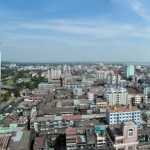Despite international investors continuing to diversify their real estate portfolios throughout the Asia Pacific region, Thailand and a few other property markets continue to be dominated by local investors, according to CBRE’s Asia Pacific Investment Guide 2015. Some countries, like Hong Kong and Singapore, have been active in trying to curb foreign investment in property while other countries including Vietnam and Indonesia are encouraging it with new measures.
In Thailand, individual foreign investors can buy up to 49 percent of a condominium development in terms of area but the local regulation dictate that all funds must come in from overseas as foreign currency. This more or less makes it impossible for foreign investors from borrowing locally.
“The Thai market continues to be dominated by local investors because of the restrictions on foreign ownership, specifically the prohibition on foreign entities owning land,” James Pitchon, CBRE Thailand’s executive director – head of research, said. “At a developer level, foreign investment is restricted to bona fide joint ventures such as these agreed between Mitsui Fudosan and Ananda Development Public Co., Ltd. along with Mitsubishi Estate and AP (Thailand) Public Co., Ltd. to develop condominiums.”
However, CBRE noted other Asia-Pacific countries are trending in the opposite direction by relaxing restrictions on foreign direct investments. The goal is to boost domestic growth by attracting foreign capital to their countries. Deregulation measures include permitting full foreign ownership of properties in markets like Vietnam and full ownership of luxury residential condominiums in Indonesia, whereas India and China are allowing for more flexible investment policies in the property sector as well.
“In addition to the ongoing urbanization and rapidly expanding middle class in many emerging economies, the policy shift of some governments to more open foreign investment policies sends a clear and positive signal to international investors,” Richard Kirke, managing director, CBRE Capital Markets Asia Pacific, noted.
Even tighter restrictions in Hong Kong, Singapore and Taiwan can’t stop the flow of international investment entering the region as turnover increased by nine percent year-on-year to USD13 billion in the first half of this year. “Asia Pacific’s real estate is continuing to demonstrate strong, sustained fundamentals. Relative to the volatility being witnessed in global equity markets, APAC real estate provides investors with superior risk-adjusted returns,” Kirke added.



